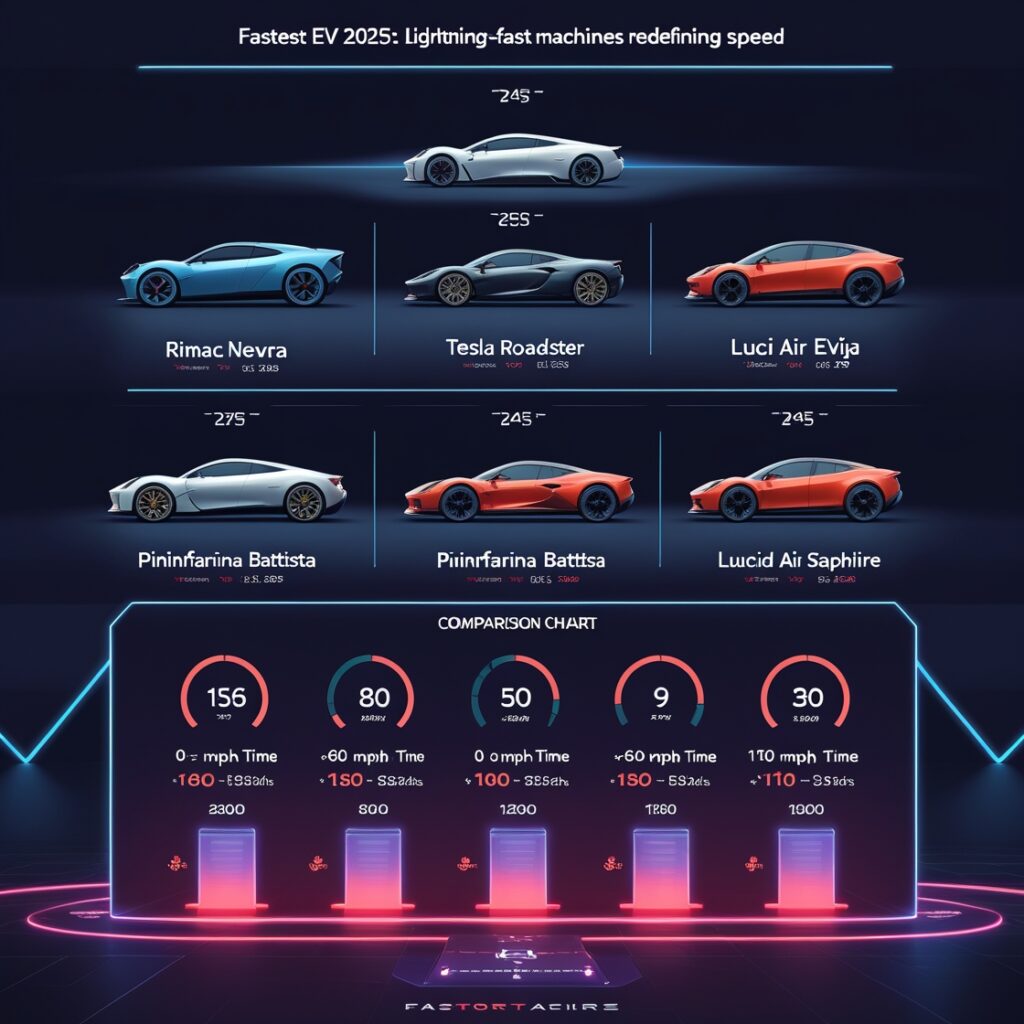Perhaps you believed electric vehicles (EVs) were solely about efficiency. Think again. The fastest EVs 2025 are not just quick; they are reinventing the concept of speed itself, challenging the reign of gasoline-powered hypercars, and proving that electric propulsion is the future of performance.

The Dawn of the Fastest EVs 2025
Speed was once the realm of combustion engines. Ferrari to Bugatti, brute power was once measured in displacement, turbochargers, and exhaust note. But 2025 is cementing a new paradigm—one in which instant torque, aerodynamics, and battery technology launch EVs into heights never before seen.
Let’s cut to the chase. Here are 2025’s fastest EVs, measured by 0-60 mph times, top speed, and overall engineering marvels.
1. Rimac Nevera – The Unchallenged Titan
0-60 mph: 1.74 seconds
Top Speed: 258 mph
Horsepower: 1,914 hp
Price: $2.1 million
Rimac has done it again. The Nevera is still the undisputed king of electric hypercars, providing physics-defying acceleration. With its quad-motor setup and advanced aerodynamics, it leaves traditional supercars gasping for air.
What makes it even more astonishing? It’s not just a drag racer. The Nevera is built for the track, capable of delivering sustained high speeds without thermal issues, thanks to its liquid-cooled battery technology. If you’re looking for the pinnacle of electric performance in 2025, this is it.
2. Tesla Roadster (Next-Gen) – The SpaceX-Infused Supercar
0-60 mph: 1.9 seconds (claimed)
Top Speed: Over 250 mph
Range: 620 miles
Price: Around $200,000
Elon Musk calls it a “hardcore smackdown” to gas cars, and for good reason. The second-generation Tesla Roadster is going to make some waves with its brain-warping acceleration and an absurd top speed. And if the SpaceX package option—which is supposedly going to add cold gas thrusters—actually comes to fruition, this could be the first EV to actually “hover.”
3. Pininfarina Battista – Italian Design with Brutal Performance
0-60 mph: 1.8 seconds
Top Speed: 217 mph
Horsepower: 1,900 hp
Price: $2.2 million
A product of Italian style and Rimac’s technological magic, the Battista is an electric grand tourer that sacrifices nothing. Its 120 kWh battery pack and four motors combine in a symphony of speed, equalling its internal combustion siblings in searing acceleration and jaw-dropping aesthetics.
4. Lotus Evija – The Electric Lightweight Contender
0-60 mph: Sub 2.0 seconds
Top Speed: 218 mph
Horsepower: 2,011 hp
Price: $2.3 million
Lotus has always had the mantra of “simplify and add lightness.” The Evija continues that ethos, albeit now with an all-electric powertrain. With an ultralight carbon-fiber monocoque and an active aerodynamics system, the Evija is meant to dominate straights and corners, and makes the argument that EVs can be every bit as thrilling as traditional supercars.
5. Lucid Air Sapphire – The Family Sedan That Humiliates Hypercars
0-60 mph: 1.89 seconds
Top Speed: 205 mph
Range: 427 miles
Price: $249,000
Not all speed demons are two-seaters. The Lucid Air Sapphire is a luxury sedan with performance numbers that embarrass Ferraris. With over 1,234 hp and an ultra-low drag coefficient, it’s proof that practical can be powerful too.
The Tech Behind the Fastest EVs 2025
So, why are these EVs so fast? Three reasons:
1. Instant Torque from Electric Motors
Unlike combustion engines, which build up power incrementally, electric motors deliver maximum torque instantly. The result is mind-warping acceleration times that gasoline vehicles cannot match.
2. Better Battery Cooling and Efficiency
Heat is the worst enemy of high-performance EVs. Manufacturers are developing liquid-cooled battery packs and sophisticated energy management systems to preserve performance under extreme conditions.
3. Active Aerodynamics
EV manufacturers are employing active aerodynamics—adjustable wings, adaptive air vents, and even ground effects—to reduce drag and improve stability at high speeds.
The Future of Fastest EVs 2025: Will Gasoline Supercars Keep Up?
2025 is the tipping point. The traditional supercars are just about keeping pace with EVs, not just in acceleration but also top speed. With improving battery density, as well as solid-state and light materials technology, electric hypercars are only going to get faster.
The Fastest EVs of 2025 are more than just cars—they are statements. Statements that the future of performance is electric, that speed is no longer shackled to internal combustion, and that innovation is accelerating faster than ever before.
If you’re still doubting electric performance, the numbers don’t lie. These machines aren’t just keeping up with gasoline hypercars; they’re leaving them in the dust.
The revolution is here.